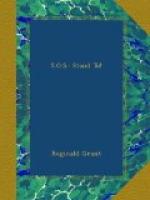[Illustration: Over the Top]
With their unexcelled means of observation, they soon discovered where our little battery was hidden, and decided to end the argument with our troublemaker there and then.
A smothering fire burst upon us, and one of the shells clipped a large tree as easily as if it had been done with a giant razor, and it crashed down directly in front of our gun, putting it out of business for the time being.
In a few minutes more another shell landed on the gun forty feet to our left, ending its usefulness, killing the crew to a man and leaving but two guns working; a few moments more and another lit in the telephonists’ pit fifteen feet to our rear, wiping out three or four of the fellows on duty there. Lord! it was getting hot!
We were then ordered to “Stand Down” (take cover), as the fire was getting hotter each second and it had all the appearance of being a wipe-out. I ordered my crew to beat it for the dugout, staying behind a moment or two to set the sight and fasten the lanyard to blow up the gun if needed. They started out of the gun pit, taking the turn to the right, along the path to the dugout, which was fairly well sheltered by big trees. I finished my work in a minute or two and took the turn to the left. When I reached the dugout the O.C. inquired where the men were.
“They ought to be here, sir; they left ahead of me. I will go at once and find them.”
“I’ll go with you.” And we started through the trees. The dugout was only about forty yards in the rear of the gun pit and half way there we came across my crew lying underneath a huge tree, dead. It had been rooted from the ground, hurled in the air with the same ease as a toy balloon and dropped on the men. The hole torn in the ground at the root was big enough to swallow a horse and cart. Of the five members of my crew four were dead; the remaining man, Bill Clark, had fourteen wounds in one side of his body from splinters of the tree.
I took him to the dressing station, where his wounds were dressed. As soon as he recovered consciousness he asked what had happened, and when I told him that his pals, including his bosom chum, Jim Chandler, had all been killed, he again lapsed into unconsciousness. He was later taken to the hospital, where, after a nine-months’ battle with the Grim Reaper hovering constantly over his bed, he at last regained some of his old-time health. But he will never again be on the firing line.
Every man was now weary, sore and thirsty, and my only grateful recollection of that day’s work was the O.C.’s command that we be given an extra ration of rum. I am not a constitutional advocate of the brew that glistens like gold, but that was one time when I thanked the good Lord for that drink.
Information was conveyed to the wagon lines of the terrible toll that had been exacted that day and the number of men that were needed to replace the casualties. Our parson, hearing what was going on in front, volunteered to come and officiate at the burial of the men that night, and mounting his horse he started in company with Archie Meehan and a small relief party.




